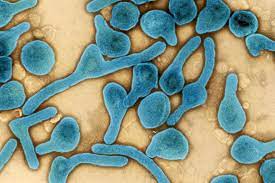Marburg Virus Disease : First-Ever Outbreak

The World Health Organization recently said that Equatorial Guinea had confirmed its first-ever outbreak of Marburg disease.
- Marburg virus disease (MVD) earlier known as Marburg hemorrhagic fever, is a rare but severe hemorrhagic fever that affects both people and non-human primates.
- MVD is caused by the Marburg virus, a genetically unique zoonotic (animal-borne) RNA virus. Marburg and Ebola viruses are both members of the Filoviridae family (filovirus).
- Marburg virus was first recognized in 1967, when outbreaks of hemorrhagic fever occurred simultaneously in laboratories in Marburg and Frankfurt, Germany and in Belgrade, Yugoslavia (now Serbia).
- The reservoir host of the Marburg virus is the African fruit bat, Rousettus aegyptiacus.
- The Marburg virus is transmitted to people from fruit bats and spreads among humans through human-to-human transmission.
- The average MVD case fatality rate is around 50%.
- There is no specific treatment for Marburg virus disease.
- Supportive therapy, such as intravenous fluids, electrolyte replacement, supplemental oxygen, as well as blood and blood products replacement, improves survival.




